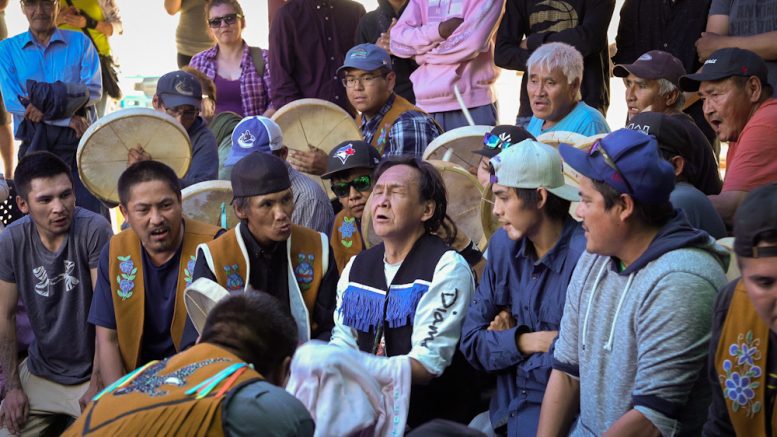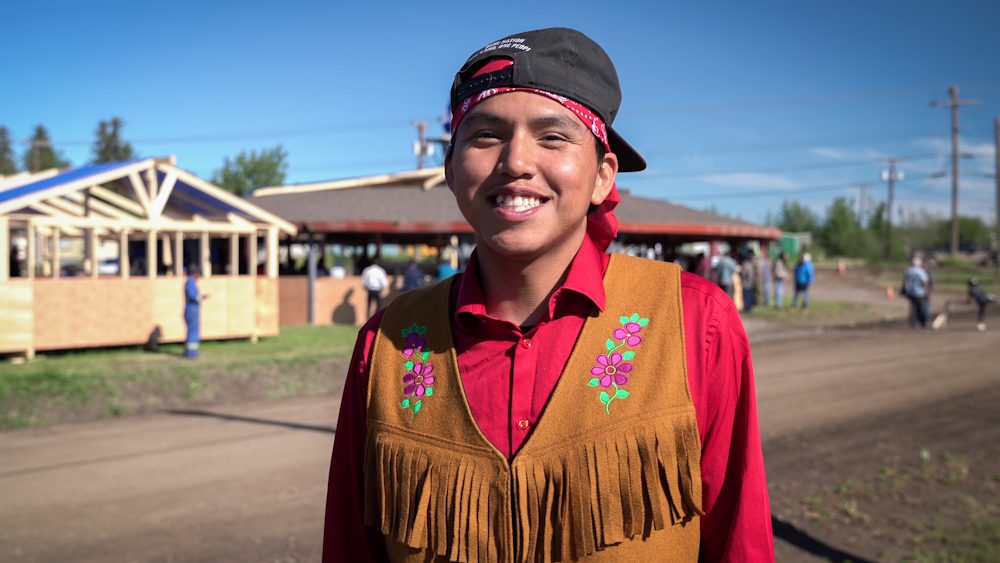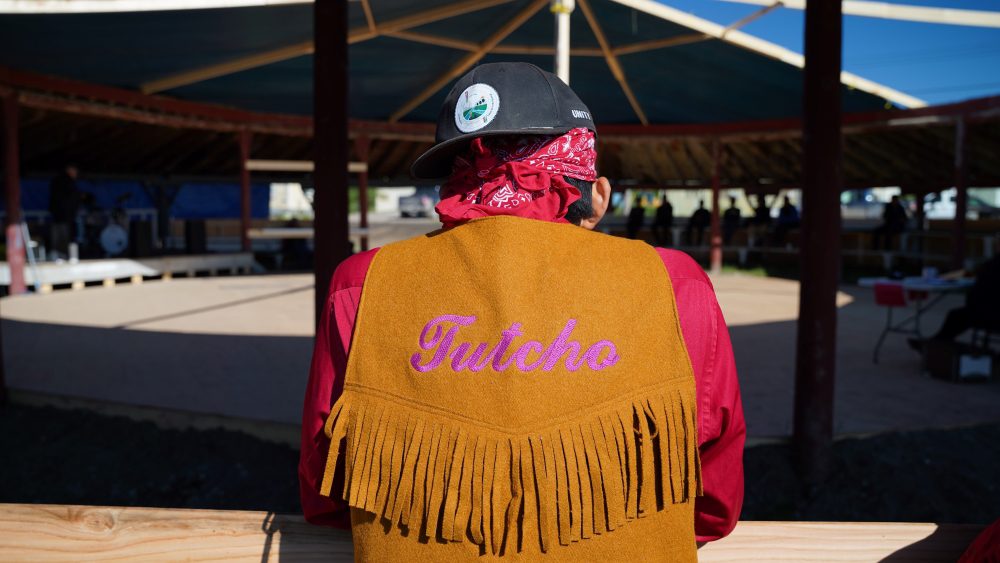The final game in Tulít’a’s recent hand games tournament featured a local team captained by Derek Widow, and Billy Tawetsi’s team coming all the way from Yellowknife and Behchokǫ̀.
The tournament featured 25 teams with players coming from many communities in the Sahtú, Dehcho and North Slave.
Ethan Tutcho was one of the younger participants in the tournament. Tutcho is from Tłegǫ́hłı̨ (Norman Wells) and was excited to compete against teams from various regions.
“It feels great to play again… Especially with more teams, it’s more fun,” he says.
For three days, the players drummed, sang and tricked one another into making wrong calls.
‘I learned a lot in the last few days’
For Joseph Rabisca, better known as ‘Trapper’, it was the first time being in the centre of the action.
The 37-year-old from Rádeyîlîkóé (Fort Good Hope) spent most of his childhood on the land with his father.
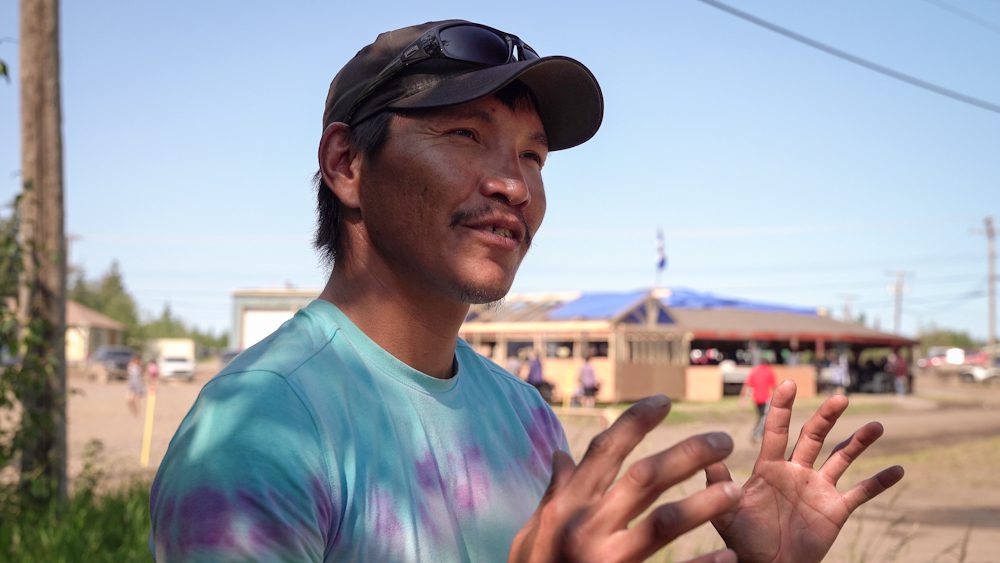
Joseph ‘Trapper’ Rabisca played in his first ever hand games in Tulít’a. (Francis Tessier-Burns/CKLB)
“The first time I came to town, I was scared of people,” says Rabisca. “I didn’t want to go to the store.”
He made it to Grade 9 and “ended up taking off out on the land” before working jobs, and getting to know the land and people across the Sahtú. Still today, Rabisca is soft spoken but gatherings aren’t so scary anymore, instead it’s just “a lot of handshaking,” he laughs.
As he was growing up, he also learned to make drums with his father “but never really played them.” Now that he’s got both the experience of drumming and hand games, he says he’ll look to go to more tournaments.
“The best part is when you’re playing, there’s a lot of drummers and the sound just takes off and revs up and then the energy rises. You don’t feel the people around you, you’re not shy, (there’s no) stage fright. There’s a lot of people watching, but you don’t think about that, you think about that game. It’s like someplace you can go where you can do whatever you want… I learned a lot in the last few days just being here.”
While he may have had a late start to his hand game career, Rabisca says he wouldn’t change his “strict” upbringing in the bush.
“If I didn’t, I wouldn’t be the man I am today,” he says. “I probably wouldn’t be hunting, trapping, all that good stuff.”
What communities have been working towards
Widow’s team battled through the ‘B’ division to make it to the finals. Now it faced Tawetsi’s undefeated team; for Widow to win, his team would have to beat Tawetsi twice.
But it wasn’t to be: Tawetsi’s team took home first place and $30,000 after winning two straight rounds.
“Hand games is such a special game that everybody just loves to play,” says Tommy Lafferty, one the players on the winning team. “When you get the chance to win, it’s always a little bit better, but the experience of playing and seeing the energy from your team and the other teams, it just makes for a really good game.”
While Lafferty and his teammates took home a nice chunk of change, it wasn’t always a smooth ride getting there.
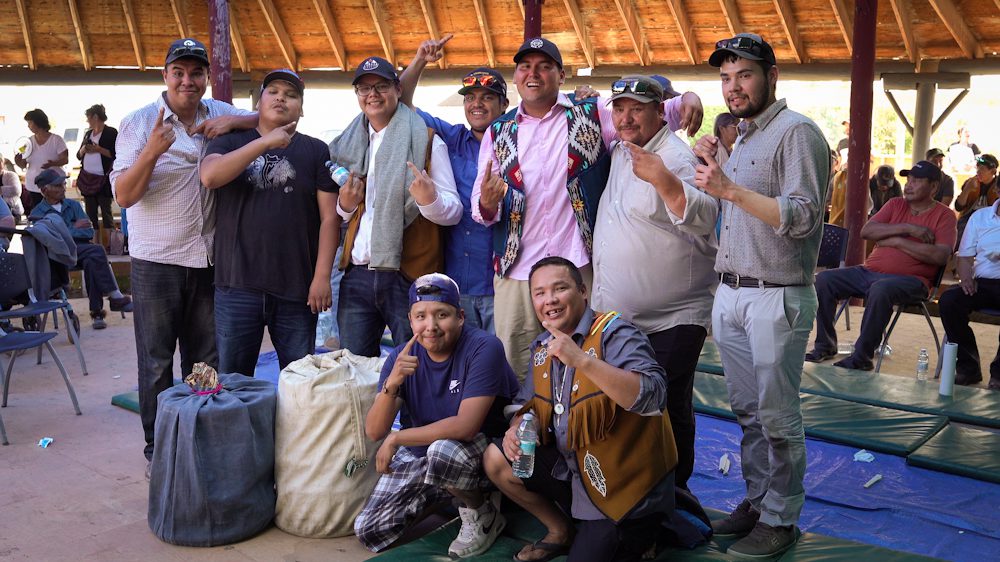
Billy Tawetsi’s team from Yellowknife and Behchokǫ̀ took home first place and the $30,000 top prize. (Francis Tessier-Burns/CKLB)
With Lafferty’s boat in tow, the team left from Behchokǫ̀ for Wrigley and hit the highway — a little too literally.
“We actually hit the highway because I blew a bearing (on my trailer) between Fort Simpson and Wrigley,” says Lafferty. He had to have the boat towed all the way back to Fort Simpson.
“That put a little hole in my pocket, but it all worked out,” he says. At least now that hole is patched up with his portion of the winnings.
Once they got to Wrigley, he says the boat wouldn’t start after the battery loosened during the ride.
Finally on the water, he said the first hour was rough ride but once the wind died down it was “smooth sailing from there.”
“It was nothing but beautiful, beautiful water and hills and land” he says. “But the whole time you’re thinking ‘Our ancestors travelled this by canoe and they travelled for days and days and days.’ And we’re doing it in hours.”
(One group followed in their ancestors’ paddle strokes and recreated a canoe trip from Délı̨nę to Tulít’a.)
The tournament came on the heels of Tulít’a’s Treaty 11 commemoration.
The gathering and the games were “a really, really big eye opener that we might be going back to normal,” says Lafferty. “We’re getting close to being normal again, and that’s what everybody has been waiting and wishing for. That’s why we’ve all been doing what we need to do to stay safe and keep our family safe.”
Now K’átł’odeeche First Nation is hoping to offer a similar experience with its own hand games tournament starting today.
The First Nation is leaning into COVID-19 regulations, requiring Alberta participants to be fully vaccinated and mandatory masking at the event.
Health officials are hoping to capitalize on the gathering as well by having a vaccine pop-up clinic on the reserve throughout the weekend.
Lafferty will be travelling with a new team to Hay River to hopefully defend his hand games champion title.
Clarification: A previous version of this story said all participants in K’átł’odeeche’s tournament needed to be vaccinated. This was based off online information provided by the First Nation. Organizers have since clarified only teams from Alberta must be fully vaccinated.

